24 Hours Hotline: +86 137-3541-1378
Email:[email protected]
24 Hours Hotline: +86 137-3541-1378
Email:[email protected]
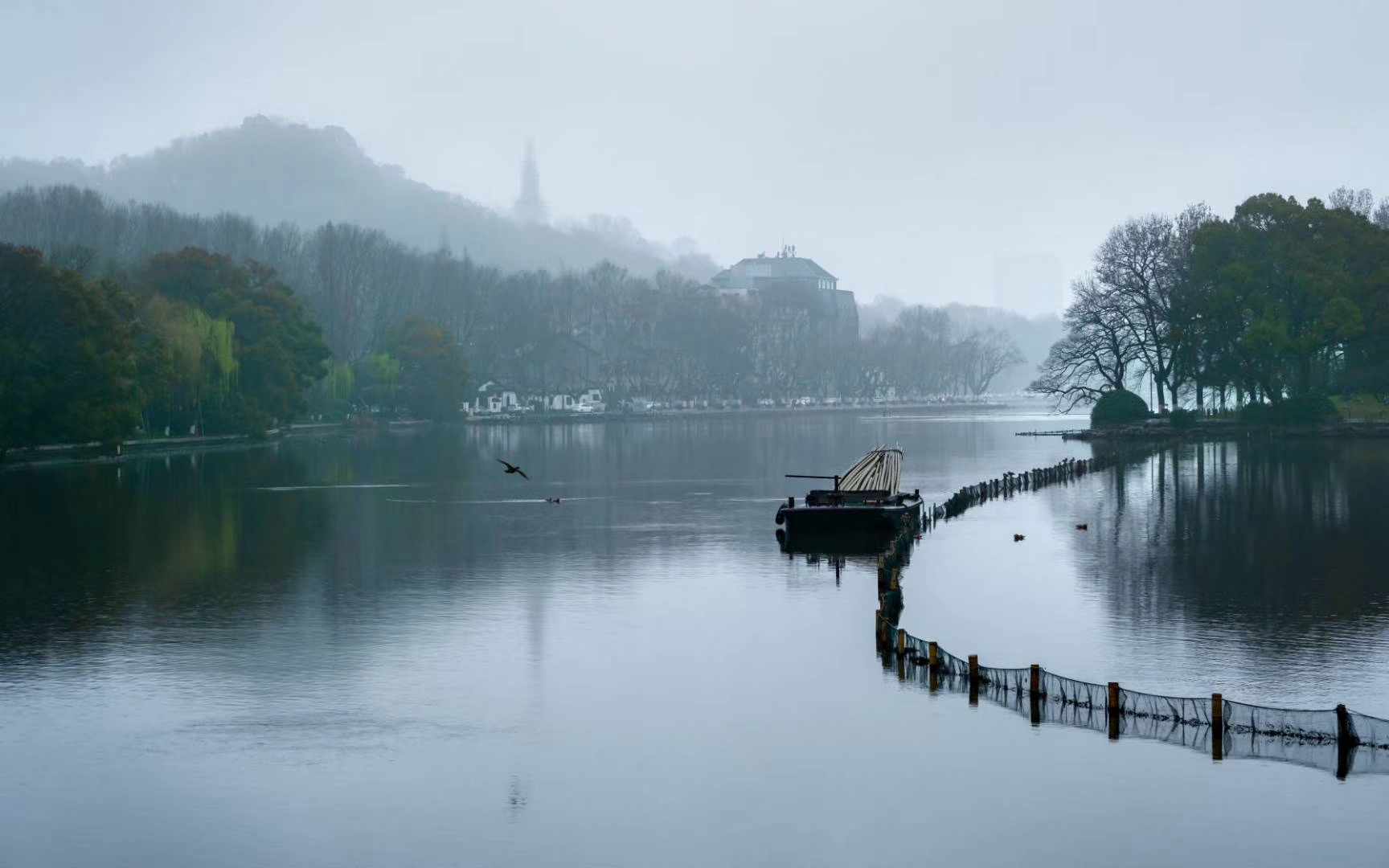
Introdution of Hangzhou
Hangzhou,
formerly transliterated as Hangchow, is the capital and largest city of
Zhejiang Province in Eastern China. Governed as a sub-provincial city,
and as of 2010, its entire administrative division or prefecture had a
registered population of 8.7 million people. The Urban agglomeration of
the Hangzhou metropolitan area (????) has a resident population of
3.9319 million as of 2003, of which 2.6367 million are permanent
residents. There are 1.91 million residents in the six urban core
districts.
A core city of the Yangtze River Delta, its position on the Hangzhou Bay 180 kilometres southwest of Shanghai gives it economic power, and moreover, it has also been one of the most renowned and prosperous cities of China for much of the last 1,000 years, due in part to its beautiful natural scenery; the city's West Lake is its most well-known attraction.
History of Hangzhou
Early history
Black
pottery of the Hemudu culturehe celebrated Neolithic culture of Hemudu
inhabited Yuyao, an area (now a city) 100 kilometers south-east of
Hangzhou, as far back as seven thousand years ago when rice was first
cultivated in southeastern China. The area immediately surrounding the
modern city of Hangzhou was inhabited five thousand years ago by the
Liangzhu culture, so named for the small town of Liangzhu not far to the
northwest of Hangzhou where the ancient jade carving civilization was
first discovered. Although Hangzhou was inhabited more than seven
thousand years ago, the great history of Hangzhou, as we know it
today,really began with the Qin dynasty. The city of Hangzhou was
founded by the Qin dynasty, more than 2,200 years back and recognized as
one of the Seven Ancient Capitals of China.
During the 10th century, Hangzhou became the capital of the Wuyue kingdom. Named Xifu at that time, it became a major cultural center, boasting fascinating Buddhist temple architecture. It also had diplomatic connections with neighboring countries.
Southern Song
Hangzhou
was chosen as the new capital of the Southern Song Dynasty when they
regrouped after their defeat at the hands of the Jin in 1123. It
remained the capital from the early 12th century until the Mongol
invasion of 1276, and was known as Lin'an. It served as the seat of the
imperial government, a center of trade and entertainment, and the nexus
of the main branches of the civil service. During that time, the city
was a sort of gravitational center of Chinese civilization: what used to
be considered "central China" in the north was taken by the Jin, an
ethnic minority dynasty ruled by Jurchens.
During
the Southern Song Dynasty, commercial expansion, an influx of refugees
from the conquered north, and the growth of the official and military
establishments, led to a corresponding population increase and the city
developed well outside its 9th century ramparts. According to the
Encyclop?dia Britannica, Hangzhou had a population of over 2 million at
that time, while historian Jacques Gernet has estimated that the
population of Hangzhou numbered well over one million by 1276. (Official
Chinese census figures from the year 1270 listed some 186,330 families
in residence and probably failed to count non-residents and soldiers.)
It is believed that Hangzhou was the largest city in the world from 1180
to 1315 and from 1348 to 1358.
Because of the large population and densely-crowded (often multi-story) wooden buildings, Hangzhou was particularly vulnerable to fires. Major conflagrations destroyed large sections of the city in 1132, 1137, 1208, 1229, 1237, and 1275 while smaller fires occurred nearly every year. The 1237 fire alone was recorded to have destroyed 30,000 dwellings. To combat this threat, the government established an elaborate system for fighting fires, erected watchtowers, devised a system of lantern and flag signals to identify the source of the flames and direct the response, and charged more than 3,000 soldiers with the task of putting out fires.
The city of Hangzhou was besieged and captured by the advancing Mongol armies of Kublai Khan in 1276, three years before the final collapse of the empire. The capital of the new Yuan Dynasty was established in the city of Dadu (Beijing).
The Venetian Marco Polo supposedly visited Hangzhou in the late 13th century. His book refers to the city as "beyond dispute the finest and the noblest in the world." He called the city Kinsay (or Kinsai) which simply means "capital" in Chinese (actually Polo used a Persianized version of the word). Although he exaggerated that the city was over one hundred miles in diameter and had 12,000 stone bridges, he still presented elegant prose about the country: "The number and wealth of the merchants, and the amount of goods that passed through their hands, was so enormous that no man could form a just estimate thereof."
The renowned 14th century Moroccan explorer Ibn Battuta said it was "the biggest city I have ever seen on the face of the earth."
Ming and after
The city remained an important port until the middle of the Ming Dynasty era when its harbor slowly silted up.
As late as the latter part of the 16th and early 17th centuries, the city was an important center of Chinese Jewry, and may have been the original home of the better-known Kaifeng Jewish community.
In
1848 during the Qing dynasty, Hangzhou was described as the
"stronghold" of Islam in China, the city containing several mosques with
Arabic inscriptions. A Hui from Ningbo also told an Englishman that
Hanzhou was the "Stronghold" of Islam in Zhejiang province, containing
multiple mosques, compared to his small congregation of aroudn 30
families in Ningbo for his Mosque.
In 1856 and 1860, the Taiping Heavenly Kingdom occupied Hangzhou and caused heavy damage to the city.
Hangzhou was ruled by Republic of China government under the Kuomintang from 1928 to 1949. On May 3, 1949, the People's Liberation Army entered Hangzhou and the city came under Communist control. After Deng Xiaoping's reformist policies began in 1978, Hangzhou took advantage of being situated in the Yangtze River Delta to bolster its development. It is now one of China's most prosperous major cities.
Hangzhou Weather
Hangzhou
is located in northern Zhejiang province, eastern China, at the
southern end of the Grand Canal of China, on the plain of the mid-lower
reaches of the Yangtze River (Cháng Jiang). The prefecture-level region
of Hangzhou extends west to the border with the hilly-country Anhui
Province, and east to the flat-land near Hangzhou Bay. The city center
is built around the eastern and northern sides of the West Lake, just
north of the Qiantang River.
Hangzhou's
climate is Humid Subtropical (Koppen Cfa) with four distinctive
seasons, characterised by long, very hot, humid summers and short,
chilly, cloudy and dry winters (with occasional snow). The average
annual temperature is 16.5 °C (61.7°F), ranging from 4.3 °C (39.7°F) in
January to 28.4 °C (83.1°F) in July. The city receives an average annual
rainfall of 1,450 millimetres (57.1 in) and is affected by the Plum
Rains of the Asian Monsoon in June. In late summer (August to
September), Hangzhou, along with other cities in Zhejiang province,
suffer typhoon storms, but typhoons seldom strike it directly. Generally
they make land along the southern coast of Zhejiang, and affect
Hangzhou with strong winds and stormy rains.
Hangzhou Attraction
West Lake
A UNESCO World Heritage site since 2011, Hangzhou's premier tourist attraction, West Lake (Xi
hú ??) and its surrounding gardens, hills, rockeries, temples, pagodas
and parks have for centuries inspired poets, officials and tourists with
their beauty. This beauty pulls an estimated 12 million domestic
tourists and half a million foreign tourists annually making it—and,
consequentially, Hangzhou—one of China's most tourist-heavy locales.
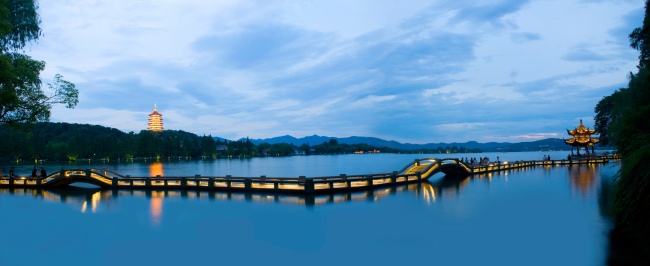
Lingyin Temple
Lingyin
temple, commonly translated as "Temple of the Soul's Retreat" is one of
the largest and wealthiest temples in China. It was originally founded
in 326 AD, but has been rebuilt no less than sixteen times since then.
The current buildings are modern restorations of late Qing buildings.
The hillside to the south of the temple is also famous as a site of old
Buddhist caves and rock carvings. Many of these date back to the time
when the temple was first founded and a great many were carved during
the blossoming of Buddhism during the Tang dynasty. Despite some damage
inflicted by red guards during the Cultural Revolution, the temple and
grounds escaped much of the wholesale destruction that other temples in
China suffered because of the protection of Premier Zhou Enlai. Today
the temple is thriving, though most of the thousands of visitors who
come do so for sightseeing and not for religious reasons.
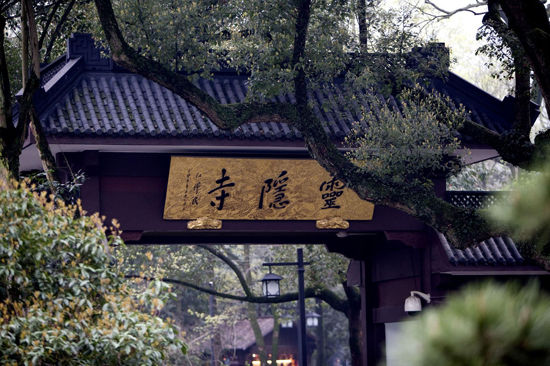
Dragon Well Tea Plantation
Drogon Well Tea (simplified
Chinese: ???; traditional Chinese: ???; pinyin: lóngjing chá), also
known as Longjing tea, is a variety of roasted green tea from Hangzhou,
Zhejiang Province, China where it is produced mostly by hand and has
been renowned for its high quality, earning the China Famous Tea title.
This tea variety is often called the national drink of China and is frequently given to visiting heads of state. It is a favorite tea amongst the Mainland Chinese leaders, with a portion of production reserved for government customers.
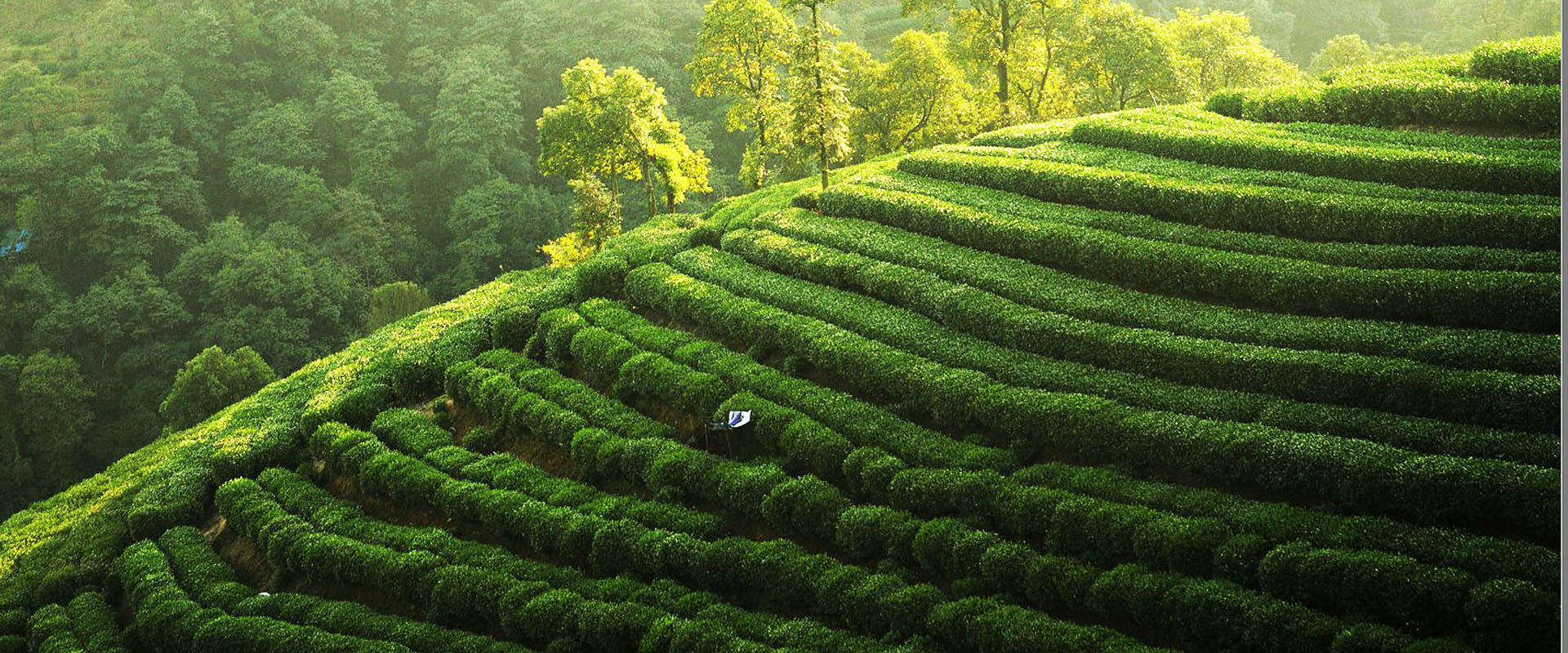
Six Harmonies Pagoda
Located
on Yuelun Hill overlooking the Qiantang River, and to the south of West
Lake (Xi Hu).The pagoda was named 'Liuhe' to signify the harmony of
heaven, earth, and the four directions: east, west, south and north.
Six Harmonies Pagoda (Liuhe Pogoda) is one of the true masterpieces of ancient Chinese architecture. According to historic accounts, the pagoda was constructed first in 970 by the King of Wuyue, who ruled the area that is today made up of Jiangsu, Zhejiang and Fujian provinces. The purpose for building the pagoda was to calm the tidal waters of the Qiantang River, aid in navigation.
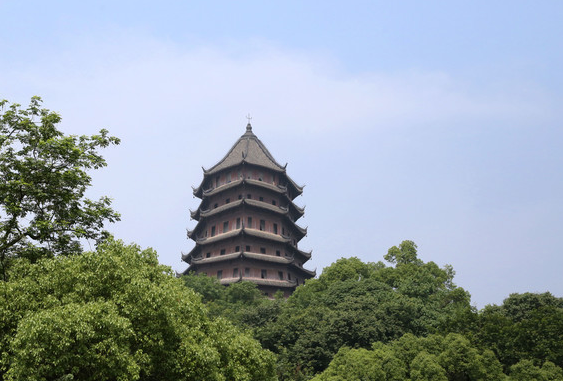
Qinghefang Street
Located
at the southern end of Yan’an Road and the northern foot of Wu Shan
Hill in Hang Zhou, with a land area of 13.66 hectare, Qinghefang Ancient
Street (qing hé fang gu jie ?????) is one of the oldest streets and is
the only well persevered antique historic street in Hangzhou City (háng
zhou shì ???). It derived from the Southern Song Dynasty (nán sòng ??)
and became prosperous in the Qing Dynasty (qing cháo ??).
The buildings in the street were mostly constructed during the Ming (míng cháo ??) and Qing dynasties. After Hangzhou had been chosen as the capital of Southern Song Dynasty, Qinghefang witness many luxurious residence and prosperous restaurants, teahouse and stores. The street collects the business culture, construction culture and folk art culture, famous people, old alleys, ancient houses and renowned store accumulating rich historical and cultural heritage. It is the epitome of Hanghzou. The street is located close to Wu Hill (wú shan ??) and the West Lake (xi hú ??).
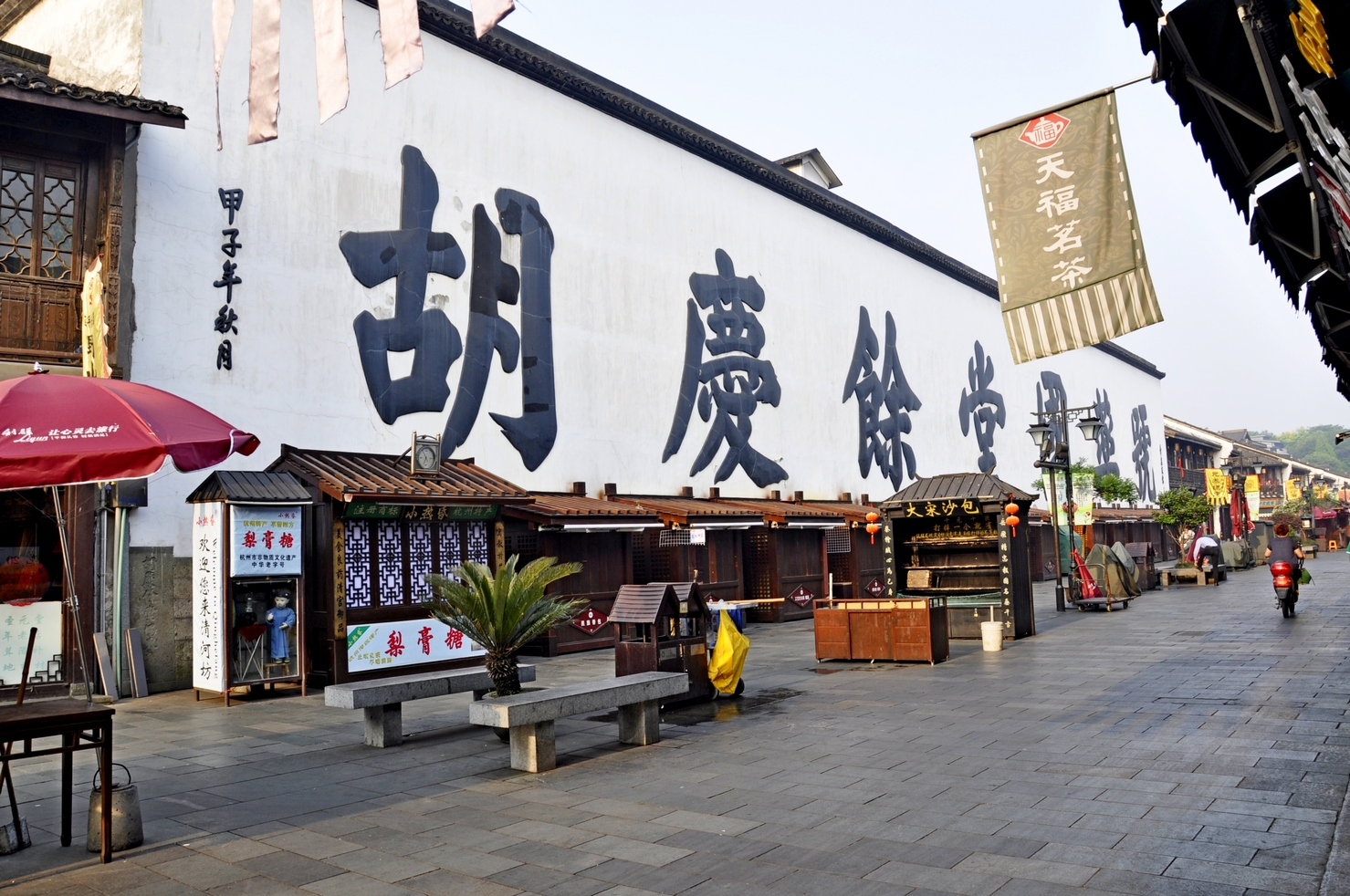
When is the best time to travel Hangzhou?
Spring,
Summer and Autumn are good travel time in Hangzhou. Hangzhou is located
in subtropics monsoon climate region and enjoys year-round pleasant
weather.
Spring (Mar-May) spreads generous sunshine. It is the blossom and tea-picking time and thus is the travel peak season.
Summer (Jul-Aug) exerts its hot and wet engine to welcome the people with sufficient heat and rainfalls. Nice time to slide the boat on West Lake patched with bloomy lotuses is memorable.
Autumn (Sep-Oct) is cool and bright. The mid-autumn festival saturated with the osmanthus scent and lightened up by the round full moon is perfect time to make a romantic night.
Winter (Dec-Mar) is above-zero cold and comes with occasional snow and frost.
Is it safe to travel in Hangzhou?
Hangzhou
is one of the safest cities in China, but small crime like pick
pocketing is still rampant and you should keep alert at all times.
Tips:
1)
Try to wear your bag in front. Keep wallet in your bags and put some
small changes in the easily accessible place like your bag's side pocket
or pant pockets to avoid flashing your wallets unnecessarily.
2) Avoid walking phoning. If you do have urgent call to make or answer, try to find a place like the wall behind you to avoid the thieves to snatch from your back.
3) Do some caution work when you take the overnight train, it is better to keep the valuable items inside your clothing. To enable you can wake up easily when necessary, sleep aids like sleeping pills, earplugs are not advised.
4) Ignore the touts that approach you and try to get you to somewhere when you come out /to the train stations, bus stations or borders.
5) Better to go to big shops or restaurants or hotel lobby to get your orientation if you loss your way.
6) Get the Xerox copy of your passport and your Chinese visa to avoid the trouble of steal loss and respond the police's check.
Transportation
By Bus
Hangzhou
bus fare ranges from CNY 1- 4. The pay amount is usually signed at the
bus stop next to the bus number and you'd better tender the exact notes
since most of the buses are self-service ticketing bus. Since most of
the bus information is wrote in Mandarin, it is advised to make the
reparation work like consulting your hotel staff or searching one the
Google map for the bus route, number and the charge, etc.
By Taxi
Hangzhou taxis start from CNY 10 with CNY 1 additional fuel tax.
Water
bus (7:30am--6:00pm) down the Grand Canal departs every half an hour at
Wulin Gate/West Lake Culture Plaza. The ticket charges about CNY 3.
Canal boat boards at 9am and 1pm and the one-hour trip unveils the historic canal and the daily life along the canal. The ticket charges about CNY 50.
Great Canal night cruise departs at 7:30pm at Wulin Gate and finishes at 9:00pm. The upper seat charges CNY 80 and first-floor seat CNY 50.
Qiantang River night cruise departs at 7:15pm at Wulin Gate and finishes at 10:00pm. The upper-floor seat charges CNY 120 and first-floor seat CNY 80.
The boats to the islands of West Lake can be taken in the Hubin parks (Hubin 1 Gongyuan, Hubin 3 Gongyuan, Hubin 6 Gongyuan) and other obviously signed spots all over the lake.
By Bike
Hangzhou
has an extensive cheap public bike system. The bike can be easily
rented and returned in the bike service lots around the west lake and
the city center. You can get a smart card after presenting your ID (such
as a passport) and paying CNY 200 deposit and CNY 100 rentals fees. The
deposit will be returned on your bike return with the receipt. Swipe
the card against one of the automated bike racks holding the bikes and
take one. The bike is free for the first hour, CNY 1 an hour for the two
hours after that, and CNY 3 an hour thereafter. There are also bike
rental agencies along the lake or at the entrance of Zhongshan Park in
Solitary Hill that you can charter a bike with CNY 300 deposit and CNY
10 rental fee per day.
Hanzhou Emergency Call Numbers
110 Call police for help in any danger
119 Dial this number when fire or other disaster happens
120 Call for an ambulance
122 Dial this number when a traffic accident happens
Stay Healthy
Sir
Run Run Shaw Hospital, 3 East Qingchun Road, named for the Hong Kong
media mogul who funded its construction, SRRSH is one of the best
hospitals in the city. VIP medical service can be purchased for 100 RMB,
which includes an English-speaking nurse attendant and expedited
service. Phone +86-571-86006613
Wechat: Chinaprivatetour
24 Hours Hotline:
+86 137-3541-1378
* Authentic Experiences: Genuine local experiences that immerse you in the true essence of Hangzhou and beyond.
* Safety First: Highest safety standards with secure activities and reliable transportation.
* Customizable Tours: Flexible itineraries tailored to your interests and needs.
* Local Expertise: In-depth knowledge of Hangzhou and China, offering exclusive insights.
* Professional Guides: Licensed bilingual guides with over 5 years of experience.
* Comfortable Travel: Experienced drivers and well-maintained vehicles for a smooth journey.
* Sustainable Tourism: Commitment to responsible tourism and supporting local communities.
* Customer-Focused: Personalized service and continuous improvement based on your feedback.
* Free Cancellation: Cancel up to 24 hours before travel for flexibility and peace of mind.
* 24/7 Support: Round-the-clock assistance for any questions or help needed.
1 to 1 tailor-made service from our professional travel advisors for the most sophisticated
Constantly excellent reviews for attraction, hotel and service Competitive price
Local experts provide quality tours Best selected knowledgeable local guides Authentic local restaurants
7*24 hours available to create you a worry-free tour. No Hidden Fees and absolutely no pressure to buy. Secured








Copyright © 2017 Hangzhouprivatetour.com All rights reserved.